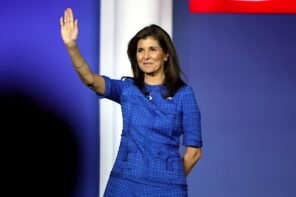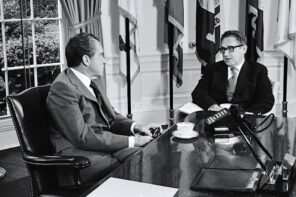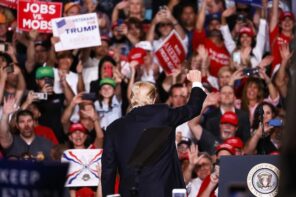If Anglican Bishop Andudu Adam Elnail of Kadugli, Sudan had not been in Denver receiving medical treatment in early June, he might be in a mass grave now. He certainly thinks so. Andudu shared his thoughts on the humanitarian crisis in Sudan in an interview with Religion Dispatches as he drove from Denver to DC, where international media, members of Congress, and human rights groups waited to hear his story.
The Sudan Armed Forces invaded the province of South Kordofan on June 5 and began house-to-house searches for opponents of the Khartoum regime, along with those of the wrong race, religion, or ethnicity. Many were rounded up and taken away, or summarily executed. The Nuba, a number of peoples who populate the Nuba Mountains, were being hunted and killed. Aerial bombing campaigns were carried out. Tens of thousands fled. Reports trickling out of Kadugli, the provincial capital, describe it as a “ghost town.”
Armed men searched in vain for Andudu (who goes by his first name). But his church—the diocesan cathedral, a small brick structure, very humble by Western Anglican standards—was looted and burned, as was his home.
Andudu came to Washington to call on the international community to intervene in order to save his people. In so doing he carries a Christian message at odds with those voices seemingly eager for religious war with Islam.
As the head of an Episcopal interfaith committee in South Kordofan, he says he maintains good relationships with many Arabs and Muslims. While “some Islamic extremists” don’t like it, and some view him as inferior and an infidel because he is black and Christian, this is far from universal. He wants the world to know that the Khartoum regime not only does not speak for all Arabs and Muslims, but that most of the victims of Khartoum’s genocide in Darfur, were Muslims.
But in his region of the Nuba Mountains, he emphasizes, “there are marriages between Christian and Muslim families, so we are showing the world how to live together. We know how to build relationships based on mutual trust and respect.”
War Without End?
South Kordofan is but the latest front in the civil war gaining steam in the run-up to the July 9 date for the formal independence of southern Sudan. Like the residents of Kadugli, in the northern border state of South Kordofan, many Sudanese are finding themselves on the wrong side of disputed borders. There are, for example, many armed people aligned with the south’s Sudan People’s Liberation Army (SPLA) who live in and near Kadugli. This has allowed Khartoum to claim that they are fighting “rebels.” And while there is some truth to that, the regime is apparently using the wrenching transition to two states as a cover for ethnic cleansing.
Reports trickling out of the area are grim, and filled with horrific details. Rev. Eberhard Hitzler, Director of the Department for World Service, the humanitarian and development arm of the Lutheran World Federation in Geneva, Switzerland provided RD with a brief, reporting that there has been “serious aerial bombardment” by the Sudanese Armed Forces (SAF) inside Kadugli town, and that “SAF is distributing guns to non Nuba tribes (Arabs) in the town.”
“Nuba people are being arrested from every point now,” he continued. “SAF intelligence are spread to capture every Nuba that tries to flee outside Kordofan borders. They are arresting Nuba who are in the army, police, and any other organized forces.
“Serious atrocities are being witnessed between Kadugli and Dilling. Nuba people are being dragged and killed instantly from lorries trying to ferry them northward for safety. Unnecessary checkpoints are put to trap the Nuba fleeing the violence from Kadugli and Dilling. The Nuba people who escaped to safety are being hunted like rats. Anyone found with SPLM card (ID), flag or document is summarily executed without interrogation.”
Similar alarms about mass atrocities and an immediate humanitarian crisis are sounding from many quarters, such as Amnesty International, Human Rights Watch, and The UN Refugee Agency. The debate over how best to respond has begun. The anti-genocide Enough project of the Center for American Progress, for example, has called for arming the south with “air defense capabilities” to protect civilians from aerial bombardment.
Allegations of ethnic cleansing by the SAF and allied militia during the invasion of Abyei in May foreshadowed the current crisis, and indeed this is the same Khartoum regime whose leaders were indicted by the International Criminal Court for war crimes, including genocide, in Darfur.
Many stakeholders are nevertheless trying to salvage the 2005 peace accords that ended decades of civil war in which some two million people died. In January the south elected to secede with upwards of 95% of the vote. But 75% of the nation’s oil production of 480,000 barrels a day is located in the south, contributing to disputes over fertile border regions, and how to apportion oil revenues.
As displaced people flee Kadugli in all directions, Bishop Andudu has become a refugee of a different kind: He is a black African Christian leader called to the world stage as a voice for the persecuted, the displaced, the slaughtered, and the silenced. He had some time to talk to RD about this new role as he and his American Episcopalian guides drove East from Denver to Louisiana, up through South Carolina to Washington DC.
______________________
RD: A number of American human rights experts have said that the killing and forced displacement of the Ngok Dinka people from Abyei in May, and their replacement by the Arab, northern-aligned Misseriya, constitutes “ethnic cleansing.” Is ethnic cleansing part of what is happening in Kadugli?
Since 1983, many Nuba people have been killed in Lubba Village—men, women, even children—put in huts and burned alive. The Sudan Armed Force’s Antonovs—Russian-made planes whose sight and sound is familiar to any child here—have done bombing campaigns, killing, maiming, and displacing thousands of Nuba people.
Now in the current war which started two weeks ago and escalates day by day, thousands have been killed in Kadugli and bombed by Antonovs across the towns and villages of South Kordofan. The government of Sudan has blocked roads and closed the Kadugli airport. The humanitarian aid organizations have been obstructed from distributing food and other aid to families around and within Kadugli, the capital of South Kordofan. That is death! This is the government killing its own people defiantly. This is ethnic cleansing, to grab up the land and its resources by driving out and killing the people of Nuba who are rightful owners of the land.
If I were not here in the United States, I might be in a grave in Kadugli by now, out behind our looted and burned-down cathedral. By the grace of God I am alive. My people are being hunted down house-to-house, arrested, tortured, and bombarded by their own government. Our homes, aid centers, and churches have been burned down and the Nuba people are being trampled down.
In the months prior to the invasion of Abyei, there were many signs of what was to come: Military equipment—tanks, planes, helicopters and more positioned near the border, as well as looting and burning of homes. What has it been like in and near Kadugli during this period?
This is not the first ethnic cleansing campaign that the Nuba Mountains have seen. For months and years, we saw signs leading up to the current crisis. We saw the corruption of the census in 2008 and the obstruction of political participation. We saw protests over the appointment of Governor Haroun—who is wanted by the International Criminal Court for genocide in Darfur—and the razing of El Feid, the home village of his leading opponent. The members of the State Election Committee received threats that they had to declare Haroun the winner or they would be killed. These things are well known in South Kordofan. Haroun and Sudanese President al-Bashir, also wanted by the ICC for war crimes and genocide, are continuing what they began in the 1985-2002 conflict and genocide.
The government began to isolate us from the outside world by cutting off power and cell phone towers. One hundred people sought refuge in the town’s Catholic church. They were forced out with tear gas. Some were hauled away by security forces. Some were killed, among them a priest, an attorney, aid workers, and people targeted because of their ethnicity or politics. This happened under the noses of UN peacekeepers who did not keep the peace.
People who escaped got word to me that armed men searched house-to-house for our pastors and called my name. They looted the seven computers and a TV from the Anglican church’s cyber cafe, and then burned it, our church offices, my house, and our cathedral.
The soldiers seem to have targeted you and the Anglican church. Why?
I am a community leader and church leader. I serve on an advisory board which represents all Christians in South Kordofan. I have argued that the Sudan Armed Forces should leave the churches and church buildings they were occupying in places like Katcha and Karkarai. I am still working to free up the Salara church buildings occupied for a long time by SAF troops. We need these buildings for church work.
As chair of an interfaith committee, I have developed good relationships with Arabs and Muslims in some parts of the state and some Islamic extremists are not happy because of that. In addition, I am black and a Christian, which means inferior and an infidel to some Muslims and Arabs—but not to all. I know some Muslims and some Arabs oppose what the Khartoum regime is doing. In the Nuba Mountains, there are marriages between Christian and Muslim families, so we are showing the world how to live together. We know how to build relationships based on mutual trust and respect, if the Khartoum regime would leave us in peace.
We shall see how people of faith around the world witness and respond to the widows and orphans and dispossessed Nuba people in our season of suffering, in our trial by fire. The Khartoum regime does not speak for all Muslims or Arabs. I know people of good will from different faith communities who want peace and reconciliation, who want our communities to be able to return to their homes and live in security and shared prosperity. But right now, hate is speaking louder than hope. And right now, hate is stamping out the Nuba people. Let us abide in the Lord and transform this current situation from hate to hope, together.
I think most of us in the U.S. don’t understand the complexities of the relationships between religious groups in Africa, and some of us tend to draw a very stark picture of Muslims against Christians. Can you help us better understand the religious dynamics of peace and war in Kadugli and more broadly in Sudan?
The issue is complex and has more to do with Arabization: some Arabs imposing their own culture on black people, refusing, denying other black cultures. In some learning institutions and schools in Sudan, there is little or no history of black people; what children learn is history from Arab perspectives.
We do not have big problems with Muslims in most parts of South Kordofan, only in a few places, especially in the areas where Arab culture and politics are mixed with radical perspectives of Islamic religion. As you can see from the genocide in Darfur, where most Darfuri people are Muslims, the Khartoum regime has shown willingness to kill Muslims; so it is obviously not just a matter of Islamic religion. The Khartoum regime is led by individuals who are Arabs and who are indicted war criminals, and who have a record of oppressing black people, whatever religions we take. But the Khartoum regime does not speak for all Arabs, any more than they speak for [all] Muslims.
As Chairman of Interfaith and Ecumenical Relations in the Province of the Episcopal Church of the Sudan, I do know firsthand and can witness about the unique and exemplary coexistence and mutual respect shown between the Muslims and Christians in the Nuba Mountains.
Civil war has been going on in Sudan for decades. President Bashir and other northern leaders are wanted international war criminals because of their actions in Darfur. They have also apparently been the main aggressor in the current conflicts and reported atrocities, and seem to be unconcerned that anyone will care enough to hold them to account.
You have requested the “urgent intervention of the international community to stop the killings and restore peace in the region.” What kinds of interventions—and by whom—do you think would be most helpful? And what do you think will happen if those interventions do not occur?
President Omar al-Bashir and other northern leaders are known to the world for the genocide they carried out in Darfur and other places. The UN, as a body for keeping human rights and justice all over the world, has been too conciliatory toward Bashir. The UN in Kadugli reported that many people were abducted—by whom, they don’t know and to where, they don’t know. This was right near the UN compound in Shair, where people went on foot, some distance from the city, for protection. They did not receive protection. Credible reports say some were taken away and killed. Therefore, we call on the United States, Britain, and Norway [nations with an historic interest in Sudan] to stop the bombing campaigns that kill civilians.
Why can’t they create a no-fly zone over the Nuba Mountains and the entire South Kordofan state to protect civilians from [our] own government’s air strikes? The international community must also intervene to open up full access for the humanitarian organizations to supply people with food, water, and medical care that will help marginalized people achieve freedom and peace. If the world stands idly by this time, then Khartoum’s troops and northern-aligned militias will bring genocide in the Nuba Mountains. This would be the latest genocide of many in an attempt at a “final solution” to the Nuba, as in the Khartoum regime’s stated purpose of eradication.




